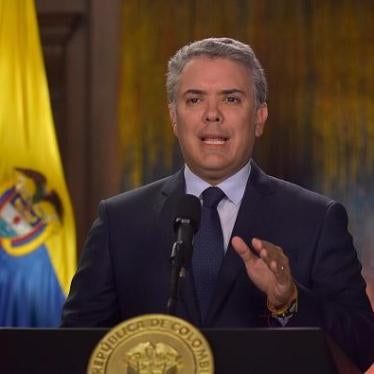Colombia will only achieve sustainable peace by protecting victims’ right to justice, Human Rights Watch said today in advance of peace talks between the Colombian government and Revolutionary Armed Forces of Colombia (FARC) guerrillas. The talks will begin in Oslo on October 17, 2012.
Colombia’s half-century-long internal armed conflict has had a devastating impact on civilians. Thousands have been killed, forcibly disappeared, kidnapped, and subject to sexual violence, and more than 4 million have been internally displaced.
“I welcome these peace talks – who could oppose initiatives to end a conflict that has produced so many atrocities and taken so many Colombian lives,” said José Miguel Vivanco, Americas director at Human Rights Watch. “But to be successful, any agreement must ensure accountability for serious abuses.”
Human Rights Watch research in Colombia over the past two decades shows that rampant impunity for atrocities has been key to enabling ongoing violations. A peace agreement that forgoes justice risks irreversibly compounding this impunity, and thus encouraging future abuses, Human Rights Watch said. It would also disregard the rights of thousands of victims of war crimes and crimes against humanity.
“The Colombian people have been waiting a long time for peace, but it will neither be durable nor just if a deal between the parties is based on immunity for atrocities,” said Jan Egeland, Europe director at Human Rights Watch.
In July, Colombia enacted a constitutional amendment, the Legal Framework for Peace, which would regulate the administration of justice in the context of a peace agreement with the FARC. The amendment paves the way for widespread immunity for atrocities committed by guerrillas, paramilitaries, and the military, and directly conflicts with Colombia’s obligations under international law, Human Rights Watch said.
The amendment empowers Congress to limit the scope of prosecutions of atrocities to those found “most responsible,” and provide statutory immunity to all the other guerrillas, paramilitaries, and military members who participated in the planning, execution, and cover up of the same crimes – but who are not deemed “most responsible.” It also gives Congress the authority to exempt from criminal investigation entire cases of war crimes – if they have not been committed on a systematic basis – and incidents of serious human rights violations, if they are not part of a widespread or systematic attack against the civilian population.
Colombia has every right to prioritize prosecutions of those most culpable for the worst crimes. But denying victims of atrocities the possibility of justice is unacceptable under international law, Human Rights Watch said.
The constitutional amendment also empowers Congress to suspend prison sentences in full or apply non-judicial punishments for all guerrillas, paramilitaries, and military personnel convicted of atrocities, including those deemed “most responsible” for Colombia’s worst crimes. Congress thus has the power to guarantee that top FARC commanders convicted of egregious crimes do not spend a single day in prison.
The International Criminal Court (ICC) is monitoring the situation in Colombia and has a mandate to open an investigation if Colombia is unwilling or unable genuinely to prosecute war crimes or crimes against humanity. To excuse those “most responsible” from their punishments would mean in practice to shield them from criminal responsibility, and be indicative of Colombia’s unwillingness genuinely to prosecute them, Human Rights Watch said.
“It is permissible for Colombia to offer sentence reductions to members of irregular armed groups to convince them to disarm,” Vivanco said. “But a peace agreement shouldn’t be a pretext for full impunity for all sides, including the military. Holding out the prospect of a ‘get out of jail free card’ to those most responsible for Colombia’s worst crimes would invite an investigation by the International Criminal Court.”
The governments of Norway and Cuba will serve as “guarantors” in the negotiations.
“Norway and the international community should not endorse any agreement that would ignore victims’ basic rights under international law,” said Egeland.







